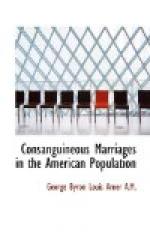As there are few families entirely free from constitutional defects of some kind, a prudent person would do well to avoid consanguineous marriage in any case—not necessarily on account of deafness, but on account of the danger of weakening the constitution of the offspring. Remoteness of blood is eminently favorable to the production of vigorous offspring, and those deaf persons who have many deaf relatives would greatly diminish their liability to have deaf offspring by marrying persons very remote in blood from themselves.
Children, I think, tend to revert to the type of the common ancestors of their parents. If the nearest common ancestors are very far back in the line of ancestry, the children tend to revert to the common type of the race. Deafness and other defects would be most likely to disappear from a family by marriage with a person of different nationality. English, Irish, Scotch, German, Scandinavian and Russian blood seems to mingle beneficially with the Anglo-Saxon American, apparently producing increased vigor in the offspring.
CHAPTER VII
SUMMARY AND CONCLUSION
Having thus considered the more important problems which have been connected with the marriage of near kin, we have only to discuss the bearing of the conclusions thus formed upon the social aggregate, and the effect which consanguineous marriages have upon the evolution and improvement of the human species.
It has been shown that the frequency with which consanguineous marriages occur varies greatly with the physical and social environments; that such marriages are more frequent in isolated and in rural communities than in cities; and that with the increasing range of individual activity and acquaintance the relative frequency of consanguineous marriage is decreasing.
Consanguinity in the parents has no perceptible influence upon the number of children or upon their masculinity, and has little, if any, direct effect upon the physical or mental condition of the offspring.
The most important physiological effect of consanguineous marriage is to intensify any or all inheritable family characteristics or peculiarities by double inheritance. The degree of intensification probably varies with the nature of the characteristic; degenerate conditions of the mind, and of the delicate organs of special sense being the most strongly intensified.




